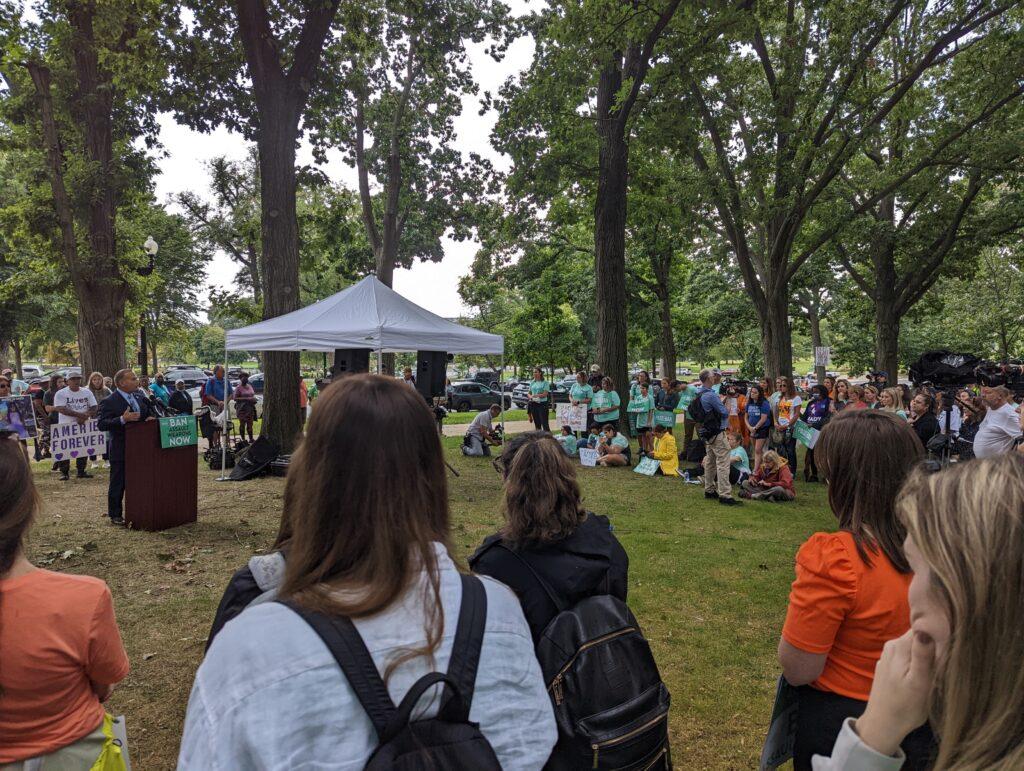CW: This article references/discusses gun violence. Please refer to the end of the article for on- and off-campus resources.
Hundreds of protesters rallied at Capitol Hill in favor of HR.1808, a bill that would enact a federal ban on semi-automatic weapons.
The protest, which occurred Sept. 22, was organized by March Fourth, a nonprofit advocacy group working to federally ban assault weapons. Many protesters were survivors or related to victims of major mass shootings throughout American history. Both survivors from the 1999 Columbine High School shooting and the more recent May 2022 shooting at Robb Elementary School in Uvalde, Texas, attended.
According to their website, March Fourth aims to activate as many voices as possible to share stories and emotion with those who make the legislative decisions.

Geena Panzitta (COL ’23), the former co-chair of March For Our Lives’ Georgetown chapter, attended Thursday’s rally and said the personal anecdotes shared by survivors made the protest even more impactful.
“Survivors spoke about the PTSD and survivor’s guilt they continue to experience. Parents spoke about their children that were gunned down at school,” Panzitta wrote to The Hoya. “It was powerful seeing these communities come together to fight for a safer America, but it was heartbreaking that they had to be there in the first place, that they were part of the ever-growing group of people affected by mass shootings.”
In 1994, an assault weapons ban was deemed constitutional by the Supreme Court and was put into effect until it expired in 2004. Following the expiration of the assault weapons ban, yearly deaths attributed to mass shootings rose. During the period in which the assault weapons ban was active, the risk of a person in the United States dying in a mass shooting was 70% lower, and nine fewer mass-shooting related fatalities per 10,000 shooting deaths were reported.
Panzitta said the event emphasized the effectiveness of an assault weapons ban given trends noted during the 10 years in which the assault weapon ban was in place.
“When the ban expired, the use of assault weapons in mass shootings spiked, particularly in public mass shootings,” Panzitta wrote. “ Federal assault weapon bans work. They save lives.”
HR.1808, which was introduced by U.S. Representative David Cicilline (D-RI, LAW ’86), passed the House of Representatives in July. The law would criminalize the importation, sale, manufacturing, transfer or possession of semiautomatic assault weapons of large capacity ammunition feeding devices.
Gun reform activists across the country have stressed the importance of passing HR.1808, and criticized inaction from pro-gun rights Republicans in Congress. Many Republican senators continue to receive funding from the National Rifle Association, which poses a problem for their ability to govern, according to Panzitta.
“These senators are cowards, putting their own political careers before the lives of the people they’re meant to represent,” Panzitta wrote. “The leading cause of death in children and teens is gun violence, yet these senators continue to do nothing about it.”
March for Our Lives Washington, D.C., Press Associate Mikah Rector-Brooks said they believe partisan politics will only perpetuate otherwise preventable deaths from gun violence.
“Given the composition of the Senate and the continuous inaction of elected officials, it is an uphill battle to get the Assault Weapons Ban passed,” Rector-Brooks wrote to The Hoya. “When the livelihood of Americans is at risk, though, it is essential for politicians to prioritize the safety of their constituents over party politics.”
The bill specifically targets semi-automatic weapons, which have been the most common weapon used in mass shootings over the past few decades, according to Rector-Brooks.
“Semi-automatic weapons have contributed significantly to the mass deaths caused by firearms in the United States,” Rector-Brooks wrote. “From Parkland, Buffalo and Uvalde to communities across the country, we have seen these weapons of war kill and devastate communities.”
Panzitta said the event highlighted the failure of state laws to combat the prominence of gun violence and mass shootings and the importance of a broader, more effective solution.
“State laws are clearly not enough,” Panzitta wrote. “We need federal legislation, and we need it now.”
Resources: On-campus resources include Health Education Services (202-687-8949) and Counseling and Psychiatric Service (202-687-6985).




















